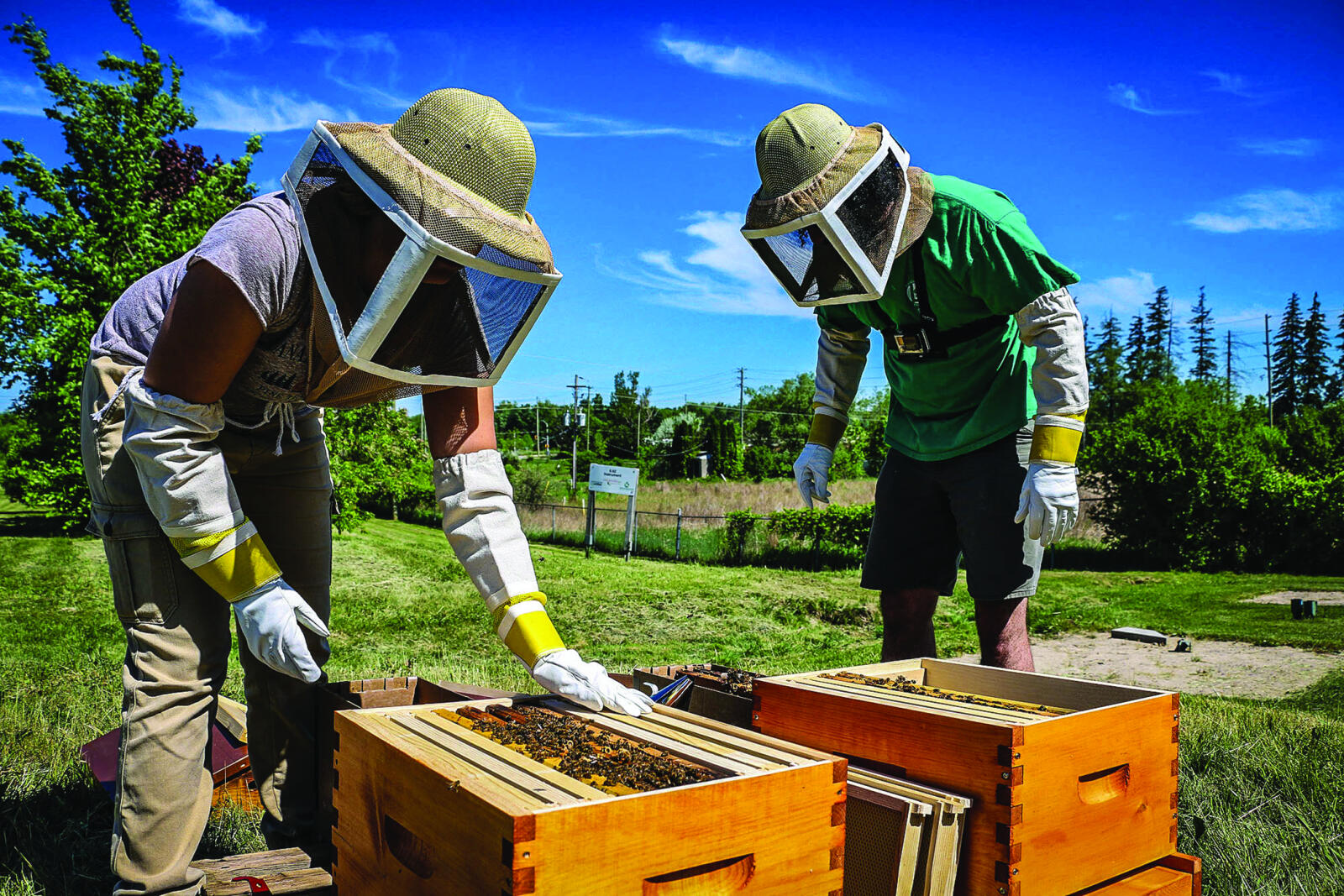November 1, 2016

LO staff Cassandra Wiesner (left) and Gregory Sumsion moving the bees into their new home.
Bees arrive at LO home office
By Cassandra Wiesner
As part of an initiative to promote knowledge on the importance of pollinators, Landscape Ontario has welcomed two hives of honey bees into a new pollinator demonstration garden at home office in Milton.
LO’s beekeepers, Gregory Sumsion and Cassandra Wiesner moved the bees into their new homes on June 1. Since their arrival, the honey bees have been very busy growing their colonies, building honeycomb, collecting pollen and nectar, and efficiently pollinating the gardens. A colony of honey bees creates a ‘super-organism’ all working together. Every bee has a job and the strength of the colony requires the help of every individual.
There are three castes of honey bees within the hive. The single queen is responsible for laying eggs (roughly 1,500 a day). There are several hundred drones (male caste) in an established hive that are responsible for mating with the queens of other hives in order to increase genetic diversity. An established hive will also have up to 50,000 (female) worker bees. The worker bees are responsible for every other task in the hive, including: cleaning, nursing larvae, attending to the queen, foraging for nectar and pollen, producing wax and fanning and guarding the hive.
Pollinators, including honey bees, are a crucial part of both the natural environment and food production. Pollinators are responsible for pollinating roughly 80 per cent of flowering plants. Pollinators feed on the pollen and nectar, and in turn, pollinate flowers, which increases genetic diversity and reproductive success.
Pollinator populations have been declining over the past few years. This is due to a number of reasons including: climate change, habitat loss and pests and diseases. The decline of pollinator species could lead to a decline of plant success, which could threaten biodiversity and our food security. Pollinators are responsible for pollinating about one-third of the foods we eat.
Landscape Ontario would like to thank Brian Scott of Innisfil Creek Honey for donating all of the hive equipment and for offering to help as a mentor and John and Chris Langendoen of Willowbrook Nurseries, for donating the plant material for the pollinator garden where the hives are located.
The Landscape Ontario site is an ideal location as it provides ample foraging opportunities for the bees. There will be an opportunity to take a look at the hives during the Trial Garden Open House on Aug. 18.
For more information on how you can make your garden and landscapes more pollinator friendly, visit landscapeontario.com/pollinator-friendly-garden.
As part of an initiative to promote knowledge on the importance of pollinators, Landscape Ontario has welcomed two hives of honey bees into a new pollinator demonstration garden at home office in Milton.
LO’s beekeepers, Gregory Sumsion and Cassandra Wiesner moved the bees into their new homes on June 1. Since their arrival, the honey bees have been very busy growing their colonies, building honeycomb, collecting pollen and nectar, and efficiently pollinating the gardens. A colony of honey bees creates a ‘super-organism’ all working together. Every bee has a job and the strength of the colony requires the help of every individual.
There are three castes of honey bees within the hive. The single queen is responsible for laying eggs (roughly 1,500 a day). There are several hundred drones (male caste) in an established hive that are responsible for mating with the queens of other hives in order to increase genetic diversity. An established hive will also have up to 50,000 (female) worker bees. The worker bees are responsible for every other task in the hive, including: cleaning, nursing larvae, attending to the queen, foraging for nectar and pollen, producing wax and fanning and guarding the hive.
Pollinators, including honey bees, are a crucial part of both the natural environment and food production. Pollinators are responsible for pollinating roughly 80 per cent of flowering plants. Pollinators feed on the pollen and nectar, and in turn, pollinate flowers, which increases genetic diversity and reproductive success.
Pollinator populations have been declining over the past few years. This is due to a number of reasons including: climate change, habitat loss and pests and diseases. The decline of pollinator species could lead to a decline of plant success, which could threaten biodiversity and our food security. Pollinators are responsible for pollinating about one-third of the foods we eat.
Landscape Ontario would like to thank Brian Scott of Innisfil Creek Honey for donating all of the hive equipment and for offering to help as a mentor and John and Chris Langendoen of Willowbrook Nurseries, for donating the plant material for the pollinator garden where the hives are located.
The Landscape Ontario site is an ideal location as it provides ample foraging opportunities for the bees. There will be an opportunity to take a look at the hives during the Trial Garden Open House on Aug. 18.
For more information on how you can make your garden and landscapes more pollinator friendly, visit landscapeontario.com/pollinator-friendly-garden.